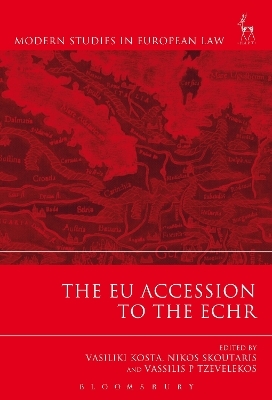
The EU Accession to the ECHR
Hart Publishing (Verlag)
978-1-84946-523-6 (ISBN)
Article 6 of the Treaty on European Union (TEU) provides that the EU will accede to the system of human rights protection of the European Convention on Human Rights (ECHR). Protocol No 9 in the Treaty of Lisbon opens the way for accession. This represents a major change in the relationship between two organisations that have co-operated closely in the past, though the ECHR has hitherto exercised only an indirect constitutional control over the EU legal order through scrutiny of EU Member States. The accession of the EU to the ECHR is expected to put an end to the informal dialogue, and allegedly also competition between the two regimes in Europe and to establish formal (both normative and institutional) hierarchies.
In this new era, some old problems will be solved and new ones will appear. Questions of autonomy and independence, of attribution and allocation of responsibility, of co-operation, and legal pluralism will all arise, with consequences for the protection of human rights in Europe.
This book seeks to understand how relations between the two organisations are likely to evolve after accession, and whether this new model will bring more coherence in European human rights protection. The book analyses from several different, yet interconnected, points of view and relevant practice the draft Accession Agreement, shedding light on future developments in the ECHR and beyond. Contributions in the book span classic public international law, EU law and the law of the ECHR, and are written by a mix of legal and non-legal experts from academia and practice.
Vasiliki Kosta is Assistant Professor of European Law at Leiden University. Nikos Skoutaris is Lecturer of EU Law at the University of East Anglia and Visiting Senior Fellow at the European Institute, London School of Economics. Vassilis Tzevelekos is a Lecturer in Public International Law at the University of Hull.
Chapter 1: Introduction
Vicky Kosta, Nikos Skoutaris, Vassilis Tzevelekos
Part I: Institutional issues
Chapter 2: Election of EU Judge onto the Strasbourg Court
Andrew Drzemczewski
Chapter 3: Too Many Voices? The Prior Involvement of the CJEU
Aida Torres Pérez
Chapter 4: The Right to Extra-Judicial Redress in EU Law after the EU's Accession to the ECHRs: Legal Framework, Challenges and the Question of the Prior Involvement of the CJEU
Nikos Vogiatzis
Part II: Issues of Attribution and Responsibility
Chapter 5: The Accession Agreement as an Opportunity: Partition of Responsibility between the EU and its Member States
Judge Giorgio Gaja, ICJ
Chapter 6: A European Law of International Responsibility? The Articles on the Responsibility of International Organizations and the European Union
Jean D'Aspremont,
Chapter 7: United We Stand. The EU and its Member States in the Strasbourg Court
Andrés Delgado Casteleiro
Chapter 8: Consequences Under the Law of International Responsibility of the Accession of the European Union to the European Convention on Human Rights for Common Foreign and Security Policy Operations pursuant to UN Security Council Resolutions
Arman Sarvarian
Part III: Coordinating Rivalry: Creating Order from Pluralism?
Chapter 9: The Fate of the Bosphorus Doctrine Following Accession
Olivier De Schutter
Chapter 10: Human Rights and the Autonomy of EU Law: Pluralism or Integration?
Piet Eeckhout
Chapter 11: The EU, the ECHR, and Logics of "Constitutional Pluralism": Democracy and Distrust in the Wider Europe
Robert Harmsen
Chapter 12: Taming the Fragmentation Monster through Human Rights? International Constitutionalism, "Pluralism Lite", and the Common Territory of the two European Legal Orders
Lucas Lixinski
Part IV: The Role of the National Legal Orders
Chapter 13: Caught in the Middle or Leading the Way? National Courts in the New European Fundamental Rights Landscape
Monica Claes & Sejla Imamovic
Chapter 14: Two Worlds (Still) Apart? ECHR and EU Law Before National Courts
Giuseppe Martinico
Chapter 15: Kissing Awake a Sleeping Beauty? The Charter in EU and National Policy Practice
John Morijn
Part V: Integration in Human Rights: Towards a Common European Espace Juridique?
Chapter 16: European Consensus and the EU Accession to the ECHR
Kanstantsin Dzehtsiarou & Pavel Repyeuski
Chapter 17: Conceptions of Equality under EU Law and the ECHR: Towards a Taxonomy of European Equality Law
Panos Kapotas
Chapter 18: Missing the Forest (of Rechtsstaat) by Focusing on the Tree (of Legal Technicalities): Wrongdoers and Innocent Bystanders before the European Court of Justice
Bernard M. Hoekman & Petros C. Mavroidis
Chapter 19: EU Accession in the ECHR: Identifying the New Legal Avenues for Access to Justice in the Area of Public Procurement
Aris Georgopoulos
Chapter 20: The EU's Accession to the ECHR and Due Process Rights in EU Competition Law Matters: Nothing New Under the Sun?
Albert Sanchez Graells
Part VI: Instead of a conclusion: Views from the Courts
A view from the ECHR
Christos Rozakis
A view from the CJEU
Christiaan Timmermans
Concluding Remarks
Bruno De Witte
| Erscheint lt. Verlag | 10.7.2014 |
|---|---|
| Reihe/Serie | Modern Studies in European Law |
| Verlagsort | Oxford |
| Sprache | englisch |
| Maße | 171 x 244 mm |
| Gewicht | 839 g |
| Themenwelt | Recht / Steuern ► EU / Internationales Recht |
| Recht / Steuern ► Öffentliches Recht ► Verfassungsrecht | |
| Recht / Steuern ► Öffentliches Recht ► Völkerrecht | |
| Sozialwissenschaften ► Politik / Verwaltung | |
| ISBN-10 | 1-84946-523-1 / 1849465231 |
| ISBN-13 | 978-1-84946-523-6 / 9781849465236 |
| Zustand | Neuware |
| Haben Sie eine Frage zum Produkt? |
aus dem Bereich


